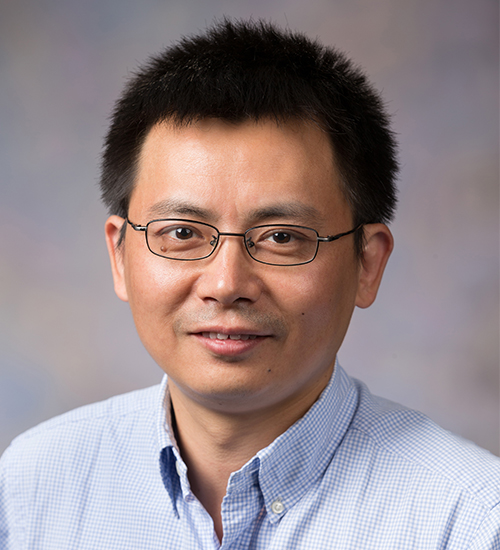Dr. Bin Gao
Professor, Environmental and Water Resources, Contaminant Fate and Transport, Hydrology
Bin Gao was trained as a chemist before taking up agricultural engineering. Accordingly, he brings a strong basic research emphasis on his work and relies on methods of the physical sciences in his work. Gao pursues two areas. In the first, he studies the environmental nanotechnology, especially with respect to the applications and impacts of engineered nanoparticles. His second area of interest involves a material called biochar. One form of biochar is very familiar; it is made from wood, and it is called charcoal. But biochar can be made from many other carbon-rich substances, and each one may have specific environmental applications.
The particles that Gao studies are in the nanometer size range. It's hard to imagine, but a nanometer is one-billionth of a meter. For comparison, a human hair is around 50,000 nanometers thick, so 500 to over a thousand of Gao's colloidal/nano-sized particles could fit in the width of a human hair. Nanoparticles have many interesting properties, but at this stage of his research, Gao's research interest mainly lies in two aspects of nanoparticles: 1) environmental applications of nanoparticles and their derivatives; and 2) how they move through the environment.
Because of the extremely fine size of nanomaterials, nanoparticles are very reactive and thus can be used in many treatment technologies for pollution control and the remediation of contaminated soils and water if they are applied properly. On the other hand, there are many colloidal and nano-sized materials moving through the environment, including surface waters, soils, etc. This is an interesting research problem by itself, and the mobility of colloids and nanoparticles makes it possible for them to carry a lot of other pollutants that adhere to them.
Gao's other research emphasis is biochar. For many people, this will be a new term, but it simply refers to the charcoal-like material that can be made from any carbon-rich biomass. Biochar is made when biomass is heated in the absence of or limited amount of air. At the correct temperature, the plant material carbonizes. Gases and oils are also released that can be used in the production of synthetic fuels. The properties of the biochar depend on the kind of biomass from which it is made and the conditions under which it is made. Gao would like to understand the relationship between biochar's properties and its source and method of preparation.
Biochar has a very complex structure when viewed under a microscope. It could be compared to a sponge because it has many openings and cavities which give biochar its special absorptive abilities. For example, activated charcoal is often used to filter air or water, because its high surface area and complex structure allow it to retain molecules.

Contact Information
352-294-6746
Office:
285 Frazier Rogers Hall
Mailing Address:
P.O. Box 110570
Gainesville, FL 32611-0570
-
Research
Departmental Research Areas:
- Biological Engineering
Research Focus:
- Biochar technology
- Environmental nanotechnology
- Contaminant fate and transport
- Emerging contaminants
- Porous media
-
Teaching
- ABE6266: Nanotech Water Research
-
Education
- Ph.D. Environmental Engineering, Cornell University
- M.S. Environmental Chemistry, Nanjing University, China
- B.S.Chemistry, Nanjing University, China
-
Professional Experience
- 2017 - Present
Professor, Department of Agricultural & Biological Engineering, University of Florida - 2012 - 2017
Associate Professor, Department of Agricultural & Biological Engineering, University of Florida - 2007 - 2012
Assistant Professor, Department of Agricultural & Biological Engineering, University of Florida - 2005 - 2007
Research Associate, Department of Biological and Environmental Engineering, Cornell University - 2003 - 2005
Postdoctoral Research Associate, School of Forestry and Environmental Studies, Yale University
- 2017 - Present
- Publications
-
Awards and Honors
- Highly Cited Researcher Award, Clarivate Analytics, 2018
- Term Professorship, University of Florida, 2017
- Research Foundation Professorship, University of Florida, 2015
- Junior Faculty Award of Merit, Gamma Sigma Delta, 2015
- Bioresource Technology Best Paper Award, Elsevier, 2015
- Chemical Engineering Journal Top Cited Paper, Elsevier, 2014
- Giglia Endowment Award, Institute of Food and Agricultural Sciences, University of Florida, 2012
- Outstanding Young Researcher Award, American Society of Agricultural and Biological Engineers (ASABE) - Florida Section, 2012
- CAREER Award, National Science Foundation, 2011
-
Other Professional Activities
- Alpha Epsilon Honor Society
